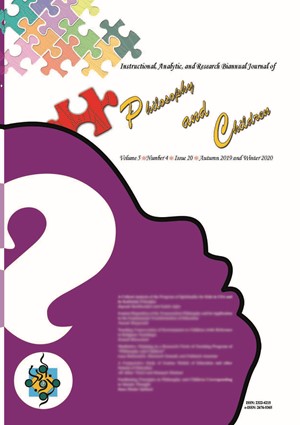-
-
List of Articles
-
Open Access Article
1 - Children and their Philosophical Worlds
Moslem Shojae Sayd Sajad Sadatizadeh -
Open Access Article
2 - The Impact of Philosophical Thinking on the Questioning Spirit of Students: a Qurānīc Approach
Roya Abdolahpour Abdolahpour -
Open Access Article
3 - The Necessity of “Philosophy and Children” as Tested by Islamic Thought with Reference to the Present Potentialities of Islamic Culture
Iman Dindar Isfahani Mehdi Mansuri -
Open Access Article
4 - Notes
Zohreh Hosaini Khamenei -
Open Access Article
5 - Centrality of the Economy of Culture in Fārābian Moral Pattern and its Function in the Program of “Philosophy and Children”
Nadia Maftouni -
Open Access Article
6 - Place of the Art of Dialectic in the Program of “Philosophy and Children”: An Explanation
Ali Asghar Jafari Valani Mahya Mehrjedi -
Open Access Article
7 - Fārābī on Rational Training
Fariba Adelzadeh Naeini1 Reza Ali Norouzi Jahanbakhsh Rahmani -
Open Access Article
8 - Teaching Intellection to the Children in Rumī’s Mathnawī
Fatemeh Bandalizadeh Zohreh Hosaini Khamenei Ehsan Gheisari
-
The rights to this website are owned by the Raimag Press Management System.
Copyright © 2017-2026







